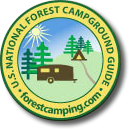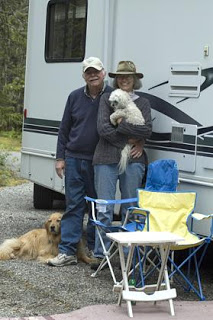Checklist for two-month road-trip
We get, on average, 100 emails every week. Often these messages are asking, based on our experiences, advice for a camping adventure. The following is an example of one such message.
QUESTION: Apart from my rig, what equipment do you need on board for a two-month cross-country road trip?
Whether you are traveling in a motorhome, travel trailer, motor coach, family car, or some other “rig,” besides the usually stuff (clothes, bed linens, bath towel, shampoo, etc) other stuff to bring:
- First-aid kit with everything from aspirin and bandages to burn medication and prescriptions.
- Insect repellant.
- Flashlights plus extra batteries. (We have become big fans of solar powered flashlights but it was an investment.)
- Travel information – maps, brochures, and a copy of US National Forest Campground Guide.
- Pleasure reading material.
- Rolls of quarters (for the Laundromats).
- Individual water bottles.
- Travel mugs.
- A journal and camera. (I find it is critical to note places, things, etc. that went on during the day and linking it to photographs I’ve taken.)
- All the usual kitchen equipment – can opener, knife, large and small saucepans, can opener, etc.
- Some extra non-perishable food stuff.
- Storage containers (we use ziplock style plastic bags as they require less space).
- Hatchet or axe.
- Binoculars (not critical but nice to have).
- Tool box with just the basics – pliers, wrench, hammer, etc.
- Duck tape. (Probably should be at the top of this list – it is that important and useful.)
- Hat, sunglasses and sun screen. (Always practise safe sun.)
- Rain or foul weather gear.
- Hiking boots or sturdy walking shoes.
- Warm clothes for higher elevations.
- If required, enough prescribed medication for the duration of trip.
- Also give careful consideration as to whether or not you should bring medical and dental records for each member of your troop (some medical offices provide electronic version of records. Don’t forget about your pet’s documentation – rabies and health certificates are a must.
Using an RV, you’ll want:
- Hose for water hook-ups (NOT a garden hose – adds a yucky taste to water).
- Black and gray drain hose(s).
- Solid waste chemical treatment (should be environmentally safe).
- Blocks and ramps for leveling.



